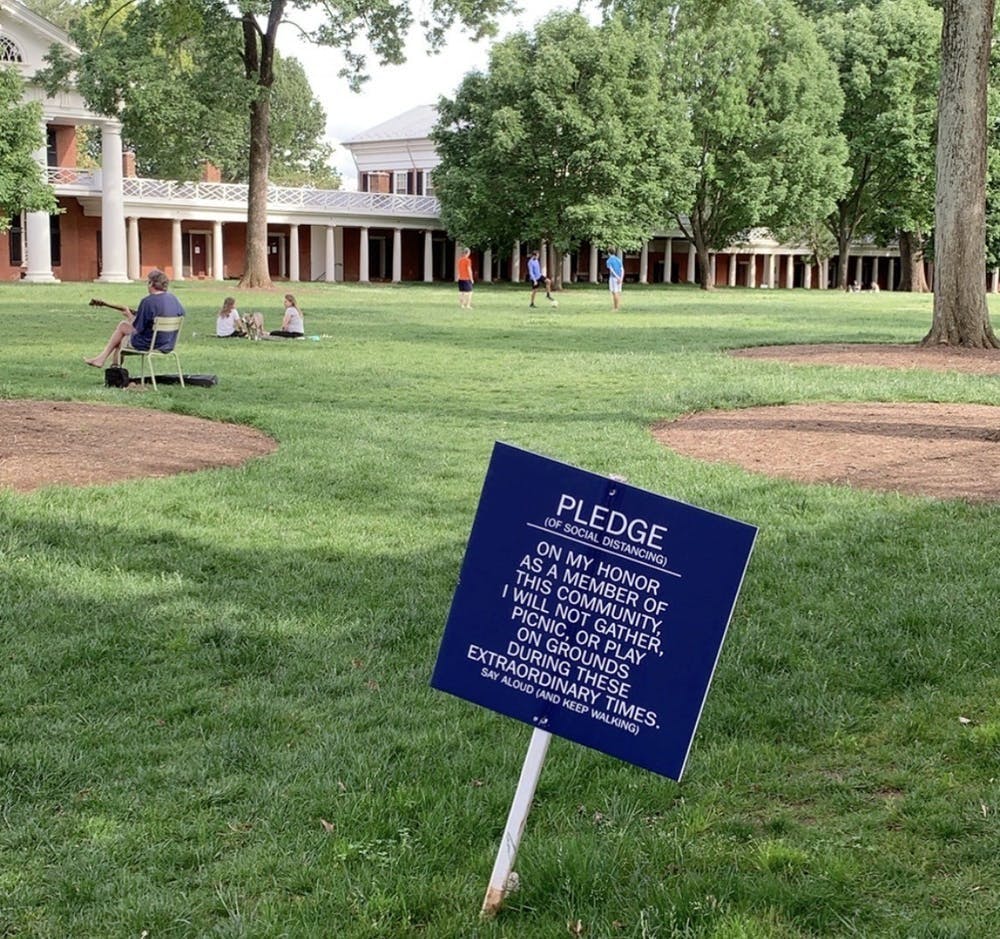In the past month, students nationwide have watched institutions rush to implement plans that have resulted in massive spikes in COVID-19 cases, leading to widespread shutdowns and placing local communities at risk. However, many students and administrators continue to err by assuming that at the University, we are different. Here, students are encouraged by videos of our leaders and our peers that urge us toward the path of individual responsibility, and here students are constantly reminded of the foundation upon which this community is built — student self-governance.
However, in recent weeks, University policy regarding COVID-19 has fallen short. Rather than relying on the lofty ideals of self-governance, students have instead turned to instinct and self-interest. Reflecting this, crowds form in and around dining halls, first-years sneak their peers into dorms and large parties make their existence known off-Grounds. In a community that relies upon personal accountability for its survival, students have been critically deprived of their ability to self-govern. In turn, many are now gambling with their lives — as well as that of their peers and the broader Charlottesville community.
Characteristic to any notion of self-governance is the concept of informed consent. Thomas Jefferson himself recognized it in the foundations of early American democracy and students today expect it in every aspect of life at the University. However, in recent weeks, this ideal has been ruthlessly undermined by misleading University policy and reckless student behavior. To begin, all students who are on Grounds made a choice to return. In other words, they have given their consent to be on Grounds. However, the differences between consent and informed consent are considerable, and students have been egregiously misled about policies safeguarding their security.
Perhaps the most notable example of this conduct is administrative reliance on the HOOS Health Check app, which students were led to believe would detect and limit the spread of COVID-19 by identifying and reporting symptomatic cases to University health authorities. However, as many have learned in past weeks, the consequences of reporting COVID-19 symptoms are naught, with those who do so receiving only a suggestion to contact Student Health. Faced with no requirement to report their symptoms and possibly daunting social repercussions, many students may instead opt to quarantine in their dorms, in turn placing everyone around them at an unknown risk. However, the concept of quarantining in a dorm is inherently contradictory, as students live with roommates and must inevitably risk encountering others to use communal bathrooms and obtain food from dining halls. Thus, not only have students been misled to believe in greater security than is really in place, but they also face the possibility of unrestrained deception from their peers. This mix of pretense, fear and anxiety is in no way a situation founded upon informed consent.
Of equal importance to the institution of self-governance is the notion of concrete and enforceable laws upon which students can depend to guide their behavior and guarantee that the behavior of their peers will not place them in danger. In many situations, the University has succeeded in establishing and enforcing community laws, including a mask-wearing mandate in all public spaces. In contrast, however, COVID-19 policy has been disregarded with reckless abandon in those places most conducive to viral transmission — student dorms.
Until recently, students were permitted to have up to 15 people in one dorm and, as late as Sept. 14, mask wearing was up to the occupants’ discretion. Not only was this policy grossly inadequate to accommodate social distancing, but it also led to inconsistencies in student behavior that can and did lead to viral transmission. Furthermore, University officials have failed to acknowledge the almost daily instances of students circumventing policy by inviting outsiders into their dorms, planning and attending parties and gathering in large groups in study rooms and on the Corner. Even those who may want to report their peers for non-compliance must have the date and location of the transgression, names of those involved and supporting documentation. In most situations, students lack almost all of this information. Further, even when transgressions are reported, students have no guarantee that their concerns will be addressed. In short, it does not take a public health official to know that violations of COVID-19 health policies are occurring undetected and unpunished on a daily basis.
Thus, we must call upon the University to stop relying upon the flawed notion of student self-governance as a pillar of public health policy. Under these extraordinary circumstances, the idea that survival can reliably depend upon the decisions of 18-to-22-year-olds is more than impractical. It is dangerous, and it is putting the lives of students, faculty and Charlottesville community members at risk.
Indeed, we must forego the notion of student self-governance and replace it with administrative accountability or we will soon face catastrophe. In relying upon students to properly address a global public health crisis, the University administration has neglected its institutional responsibilities and shifted the blame for its failures to students. However, now is not the time to entertain a faulty notion of self-governance — it is time for administrative intervention and action.
Maddie Stokes is a Viewpoint Writer for The Cavalier Daily. She can be reached at opinion@cavalierdaily.com.
The opinions expressed in this column are not necessarily those of The Cavalier Daily. Columns represent the views of the authors alone.







